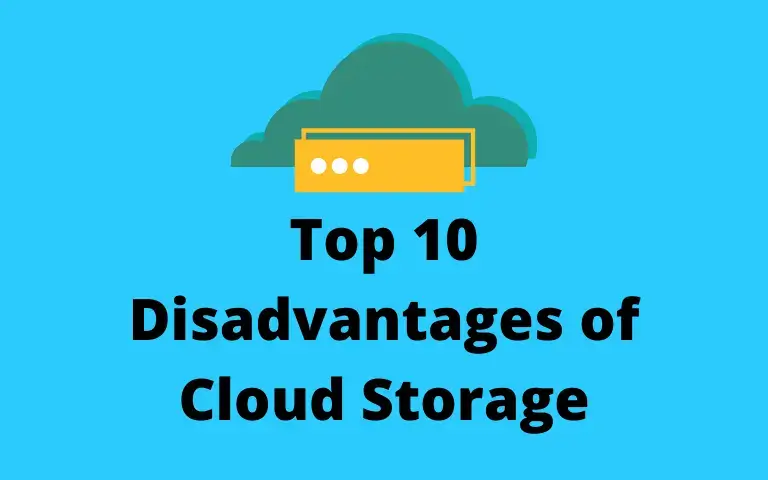Cloud data storage has become essential to the operation of most contemporary businesses. There are many benefits of using cloud storage Including a significant reduction in data loss, cost-effective operation, and scalability, just to name a few.
But in order to make an informed decision about whether cloud-based solutions really are the best for one’s needs, it’s important to look at factors that are often downplayed. disadvantages of cloud storage solutions
Let’s take a look at the 10 downsides of choosing to store your vital data in the cloud.

Disadvantages of Cloud Storage:
Below we have listed the top ten disadvantages of cloud storage services.
- Vulnerability
- data trust
- Trust the Internet connection
- Control limitations
- inconsistent performance
- Cost
- Migration
- Normative compliance
- Slower recovery times
- Minimum support
1. Vulnerability
Most servers and computers that store data need an Internet connection. The nature of the cloud makes them inherently internet-based, meaning they are interconnected with other devices and servers.
Unless a storage sector has an air gap (it has never been connected to the Internet), it is vulnerable to being compromised. The degree to which this is the case depends largely on the storage solution in question.
Data stored on cloud servers is vital to you or your business. But if the cloud storage provider isn’t using strong encryption, that data can be hacked and compromised by computer-savvy criminals.
2. Data trust
Because data is so valuable to those who store it, there needs to be a level of trust when choosing your cloud storage provider.
While many cloud solution providers claim to keep your data safe from hackers, they often neglect the fact that they have access to it and might sell it to other parties for marketing purposes.
3. Trust the Internet connection
These days, if our Internet service goes down, even for an hour, our minds experience immense levels of anxiety and frustration. Since the world is so reliant on the Internet, any service outage can have devastating results.
If a cloud storage provider is experiencing internet connection issues while files are on redundant servers, data synchronization may be delayed, slow, or temporarily unavailable.
If the internet connection is on your side, having the data saved only in the cloud will leave you defenseless in terms of trying to access it.
4. Limitations of Control
Once you transfer the data to the cloud, it becomes the provider’s responsibility. That means you’re at the mercy of and dependent on providers to keep your services secure, stable, up and running, and running optimally.
This limits the influence on data security and accessibility almost entirely, entrusting all reliability to the storage provider.
5. Inconsistent Performance
If the cloud server provider experiences local issues or a DDOS attack, it will be more troublesome for you to access data from them.
Even if the provider is fully prepared to deal with such a situation, they will not be able to resolve it immediately. The health of the servers is also constantly in question.
In both cases, the performance of storing data and retrieving it on demand can be inconsistent, which would be a problem for those who depend on access to their valuable data.
6. Cost
While cloud storage solutions are often an inexpensive option, when used for short-term projects or on a relatively small scale, the cloud provider may simply not offer adequate solutions.
For example, if your need to store data is 6 months, but the provider’s minimum is 2 years, you could be on the hook for 18 months longer than you need, and that’s not economically viable.
7. Migration
One area of cloud storage that has evolved much less than others has been the ability to migrate to another cloud solution. So this is still a very challenging situation for many customers.
If you find that one solution isn’t right for all your needs, you may want to transfer your data to another solution, although many of these options are simply not available at this time.
If such solutions are available, they could be expensive. This now requires an additional cost, commonly in the form of securing a secondary cloud storage provider, while still being bound by an agreement with the first.
8. Regulatory Compliance
Certain industries have much more limited ability to store vital data in the cloud. Unfortunately, these are often the industries that need this type of solution the most.
For example, those industries involved in the storage of patient data must be careful about the security of digital patient records due to HIPAA (Health Insurance Portability and Accountability Act) compliance.
Financial institutions can only trust cloud storage solutions that have the highest security protections.
Since regulations consider the need for certain qualifications for data security, when penalties, fines and lawsuits are imposed, it will not be against the cloud provider, but against your company.
9. Slower Recovery Times
One of the best things about having data stored internally is that, by sheer proximity, data retrieval will be faster. When you store data in the cloud, it requires more time to access.
The difference may not be significant in some cases, but when data recovery is vital to getting back up quickly, it can become a very significant difference.
10. Minimal Support
Each user and company is unique in its needs and particularities, so even when working with an intuitive, fast and secure cloud solution, problems can arise.
One of the biggest problems is that cloud storage support is significantly lacking. Many vendors don’t have live expert staff available 24/7, and many rely on automated online wizards, knowledge base articles, and FAQs.
For users without much technical knowledge, this can become a boring, frustrating, and time-consuming experience.
Conclusion:
The downsides of cloud storage solutions aren’t that worrisome, but it’s important to know and understand the risks and downsides.
The decision to use cloud storage solutions and which ones to work with really comes down to the nature of the usage and the particular needs one has of the service.
Therefore, it is advisable that you do a thorough investigation and review any cloud storage services before making use of them.











